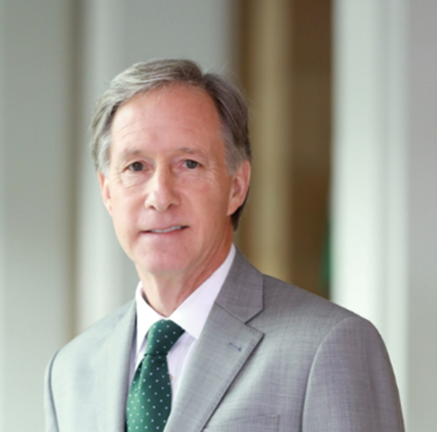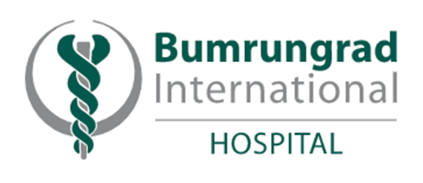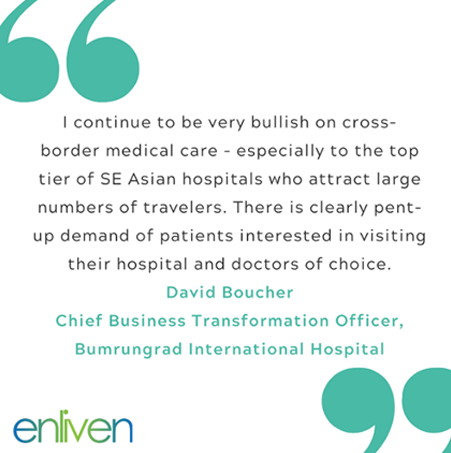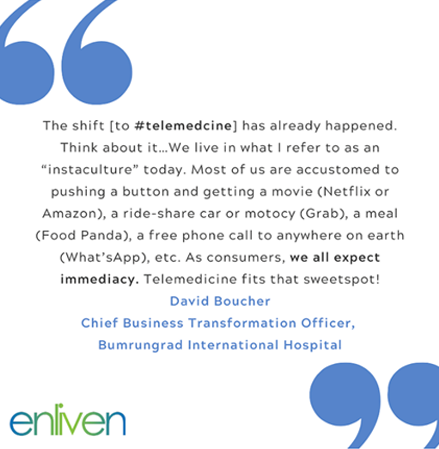After our post a few weeks ago about the future of hospitality and tourism in Southeast Asia, I had a few people ask me, “what about medical tourism?” This prompted me to have a chat with David Boucher, Chief Business Transformation Officer at Bumrungrad International Hospital. Below is the gist of our conversation on the topic.

Tell us a bit about yourself. What’s your background?
My father served in the U.S. military for nearly 30 years, so I was raised in a military family, spent almost 8 years growing up in Europe and then in several US states. I started my healthcare management career in 1978 in Pennsylvania. In two separate instances, I worked in a number of various management roles for a combined 22 years with BlueCross & BlueShield of South Carolina. Bisecting my work with the Blues, I worked for 15 years in hospital management and was the CEO of three different facilities – all in America.

How did you get into medical tourism?
I got involved in the medical tourism field quite by accident. I traveled to Bangkok in 2006 after having never been in Asia before. I spent all 5 days of my holiday “behind the scenes” at Bumrungrad International Hospital and was totally amazed at the quality, service, and safety measures that I witnessed. When I returned to Blue Cross after this vacation, I was asked to launch a new company within BCBSSC to assist with the facilitation of insured members abroad. So Companion Global Healthcare, Inc. was born. I served as President & Chief Operating Officer of Companion Global for the next 10 years. Long story short, I have been involved in disruptive innovation in healthcare from the jump. I enjoy fixing and improving services. I “retired” from my second career in healthcare on 30 June as Chief Business Transformation Officer.
What are your thoughts on the way Thailand has been handling the pandemic?
I think that Thailand has done an exceptional job with COVID-19. Recall that we were the first country outside of China that reported a case. Though the Thai government quickly implemented lockdown measures, let us be reminded that we had a couple of distinct advantages: First, people in Thailand do not shake hands, we wai. This eliminates a potential mode of transmission. Second, asking the citizenry to wear masks was not viewed negatively, since many local Bangkok residents would regularly wear masks due to poor air quality. Overall, Thailand has had 3,197 COVID-positive patients, 3,074 of whom have recovered, and only 58 deaths.
How has the pandemic affected medical tourism, particularly at Bumrungrad?
The COVID-19 has affected almost all businesses worldwide. While a small percentage of businesses have thrived, the vast majority of businesses across the globe have been negatively impacted. Over half of the 1.1 million patients Bumrungrad treats annually are non-Thai travelers, so the hospital is keen to have borders and international airports reopen.

What does the future of healthcare, particularly medical tourism look like to you?
I continue to be very bullish on cross-border medical care – especially to the top tier of SE Asian hospitals who attract large numbers of travelers. There is clearly pent-up demand of patients interested in visiting their hospital and doctors of choice.
What measures should medical facilities take to ensure patient and staff safety?
I think much of this question will be answered by the governments’ public health entities across the region. Clearly, hospitals want to ensure the safety of all caregivers, patients, and family members. If governmental agencies mandate a negative COVID-19 test prior to travel, limited quarantine, etc. then hospitals will conform. Most tertiary medical centres, like Bumrungrad, use universal precautions, and I am confident that will continue. Bumrungrad started disinfecting patient rooms and adjacent areas with robotics a few months ago. Both my wife and myself have been elective patients at Bumrungrad over the past two months and we were worry-free.
What will it take for medical travel to start again? How long do you think the market will take to rebound?
Obviously, legally-sanctioned open borders is the immediate key. Though there is pent-up demand, I believe a full recovery will still take a few months.
Has the Tourism Authority of Thailand (TAT) been supportive of medical tourists?
Yes, very much so. But all of the private Thai hospitals involved in medical tourism are awaiting clear direction and protocols from the government to proceed. Hopefully, this will be forthcoming in the near term.
Everyone is talking about telemedicine these days. What are your thoughts on telemedicine?
I have been bullish on telemedicine in Thailand since I moved here in early June, 2018. Bumrungrad jumped into direct-to-consumer telemedicine in May, 2019 with the Bumrungrad Anywhere app and I’m glad that we did. The advent of COVID-19 accelerated the expansion of telemedicine into pre- and post-surgery teleconsultation, along with the expansion from primary/urgent care to over 30 specialties.

How effective do you think the shift to telemedicine will be?
The shift has already happened. Think about it…We live in what I refer to as an “instaculture” today. Most of us are accustomed to pushing a button and getting a movie (Netflix or Amazon), a ride-share car or motocy (Grab), a meal (Food Panda), a free phone call to anywhere on earth (What’sApp), etc. As consumers, we all expect immediacy. Telemedicine fits that sweetspot!
What advice do you have for professionals in the healthcare and medical tourism industry?
We are living in unusual times. COVID-19 will not be the last pandemic in most of our lives. We need to be planners and we need to be patient.
Is there anything else you want to share with us?
In adversity always comes opportunity – if we are open to what those opportunities are! Necessity truly can be the mother of invention…it is important for all of us to have our eyes wide open and look for ways of doing things differently.
Thank you so much for your time and insight, David! I’m sure your answers will help everyone that reads this feel confident in the future of medical tourism.
Interview led by Devi Bajaj
Founder & Director of Enliven Health Concierge